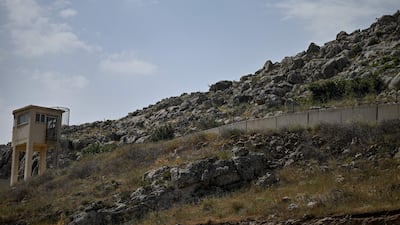Before the brother and sister of Syrian government employee Yasser Hamad fled to Germany in 2014 as part of mass migration into Europe, they begged him to join them.
“I refused because I wanted to stay in Aleppo,” Mr Hamad says from his home city.
The Syrian pound was already collapsing and the value of his salary had dropped to the equivalent of $75 a month from $300 in 2010, the year before the civil war broke out.
He is one of millions of Syrians in areas under the control of President Bashar Al Assad affected by economic devastation in the past dozen years, widespread blackouts, severe shortages of fuel, and frailties infrastructure and public services.
But it has become too late for him and many others to flee. Neighbouring countries have sealed their borders, driving up human-trafficking prices.
Host countries such as Turkey and Lebanon have become increasingly hostile to Syrians.
In Lebanon this week, the army organised a media tour to showcase border measures to prevent more refugees entering from Syria. The military says it has stopped thousands of Syrians from crossing the border into Lebanon in the past two months.
This followed threats by politicians across the divided spectrum in Beirut to force the Syrian refugee population, which numbers at least 800,000, back over the border. They say Syria is safe for refugees to return.
But a surge in fighting in the past month challenges the notion that it is safe.

Fighting and socioeconomic instability are still driving some of Syria's population to neighbouring countries.
If Mr Hamad was to repeat the journey of his brother and sisters to Germany, through a corridor comprising Turkey and the Balkans, it would cost him $10,000 to $15,000 with “reliable” smugglers.
“No one would lend me this kind of money,” he says, adding that his brother and sister paid hundreds of dollars each to reach Germany.
A sea route through Lebanon is cheaper but too dangerous, he says, due to Lebanese scammers and frequent deaths in the Mediterranean.
Mr Hamad’s monthly salary has dropped since 2014 to the equivalent of $7.
Every month, he receives $200 to $300 from his brother and sister in Germany.
Without their help, he and his family “would starve”, says Mr Hamad, who is married with two children.
He has two sisters living in Damascus, who also receive money from members of the family in Europe.
Well-off brother
One brother, Motaz, has also remained in Syria and is the only one of his siblings who is relatively well off.
Motaz is a beekeeper in the eastern city of Qamishli, which is controlled by a Kurdish-dominated militia, the Syrian Democratic Forces.
He moved there five years ago from a regime-held area in the neighbouring governorate of Deir Ezzor.
He was afraid one of his three children would be taken for conscription and did not want to pay bribes for a deferral.
Another motivation for the move was that “Kurdish purchasing power is stronger”.
But Motaz, an Arab, has become fed up with paying protection money to Kurdish warlords in Qamishli, he says.
Last week he paid thousands of dollars to smuggle his wife and three kids to Istanbul, the first leg of a journey to Germany. He plans to follow them.
Unlike many Syrians who attempt to cross the border, they were not shot at by Turkish officers because Motaz had paid enough to ensure they were accompanied by a “good” smuggler.
Failed expectations
In Damascus, the government has blamed the economic pressures on western sanctions, which were first imposed on the ruling elite and their associates in 2011 for the crackdown on the revolt.
But expectations of surging investment for reconstruction after an Arab rapprochement with the President this year did not come to pass.
Mr Al Assad was largely ostracised in 2011, after security forces used violence to crush the peaceful protest movement against his rule.
By the end of the year, Syria was in civil war and millions started fleeing.
Hopes in loyalist circles of a revitalisation in the economy were renewed after a visit by the President to China last month, on the occasion of the opening of the Asian Games in Hangzhou.
After meeting Mr Al Assad, President Xi Jinping called on the West to lift its sanctions and offered China’s help in rebuilding.
Jihad Yazigi, editor of the Syria Report business and economy newsletter, cautioned against expecting a flow of Chinese money that could reverse the decline in the currency or solve the deterioration in infrastructure, at least in the near term.
He says the invitation to Hangzhou came largely as a reaction to Arab normalisation with Damascus.
Without specific projects, such as funding an electricity plant, Mr Yazigi expects regime gains from the visit to be limited.
“When people try to leave Syria, it does not only mean that the situation is bad,” Mr Yazigi says. “It reflects a real loss of hope that it will improve.”

